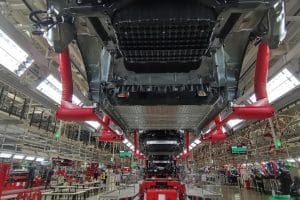- 🚛 The Tesla Semi has extremely high demand due to its low operating costs compared to diesel trucks.
- 🌍 Tesla Semi contributes to cleaner air as it emits significantly less pollution than traditional semi-trucks.
- 📈 Tesla Semi production is expected to increase, with a focus on ramping up by the end of 2025.
- 🔊 The electric truck supports quieter cities and highways, as noted during pandemic-related lockdowns.
- 🏢 Notable companies like PepsiCo are already deploying Tesla Semis in their operations.
The Tesla Semi, with its revolutionary design and performance, is set to transform the freight transport industry. At a time when sustainability and efficiency are becoming crucial for businesses, Tesla’s foray into the electric truck market has garnered significant attention and demand. This post delves deeper into why the Tesla Semi is attracting extensive interest, its environmental impact, and what the future holds for its production and deployment.
The “Ridiculous” Demand for Tesla Semi
The demand for the Tesla Semi is not just high; it’s “ridiculous,” as commented by CEO Elon Musk. What drives this fervor? Primarily, it’s the semi’s exceptionally low operating costs compared to conventional diesel trucks. Here’s a closer look at why businesses are eager to incorporate the Tesla Semi into their fleets:
- Cost Efficiency: The Tesla Semi offers a significantly lower cost per mile per ton of transport. This cost effectiveness makes it an attractive investment for businesses aiming to reduce expenses in their supply chains.
- Technological Advancements: Equipped with innovative electric drivetrain technology, the Tesla Semi promises reliability and efficiency, which is vital for freight operators.
Environmental Benefits: A Cleaner Alternative
Tesla’s mission to accelerate the world’s transition to sustainable energy finds a perfect vehicle in the Tesla Semi. Its potential to reduce pollution in urban environments is enormous:
- Emission Reduction: Semi trucks, though comprising just a small percentage of vehicles, contribute to a significant portion of vehicular emissions. The Tesla Semi, being all-electric, emits no pollutants, potentially reducing the overall footprint by a marked margin.
- Quieter Roads: The pandemic lockdowns highlighted the benefits of reduced traffic noise. The Tesla Semi supports this quieter backdrop, enhancing the quality of life in cities and towns.
Scaling Up Production: What’s Next?
Tesla is committed to scaling up the production of its Semi. Anticipation builds as the electric truck industry braces for this shift:
- Production Goals for 2025: By the end of 2025, Tesla aims to ramp up production significantly. This acceleration is crucial for meeting the burgeoning demand.
- Early Deployments and Feedback: Companies like PepsiCo are already deploying these electric semis, offering insights into performance and operational efficiency. Such partnerships are vital for gathering data and improving the model further.
Real-World Deployment and Early Success Stories
The Tesla Semi is not just a concept but a working reality for several businesses today:
- Innovative Partnerships: Collaboration with major corporations signifies trust and realization of its potential to transform logistics operations. These early deployments pave the way for broader adoption across different sectors.
Conclusion: A Roadmap to Cleaner Transport
The Tesla Semi represents more than just an electric vehicle; it’s a major step forward in the direction of clean, efficient, and sustainable transportation. As production increases and more businesses begin to adopt electric trucks, the transformation of the freight industry appears inevitable.





